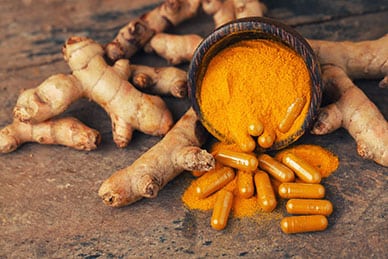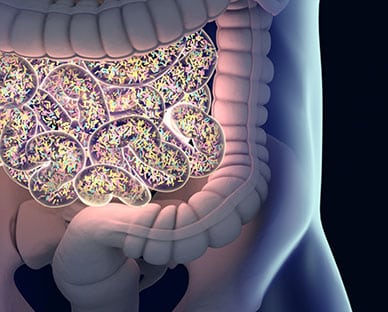A new study adds to growing evidence confirming that probiotics can protect against stress. Researchers are studying the application of a type of good bacteria that, if successful in human trials, may result in a probiotic-based immunization to battle mood disorders such as anxiety, depression and posttraumatic stress disorder.
The Complex Link Between Gut Health and Mental Health
Over time, researchers have continued to focus their efforts on investigating the complex link between the brain and gut bacteria. In numerous studies, associations have been made between the trillions of bacteria within our digestive tracts and everything from metabolic function to mood regulation. Each new study adds to supporting evidence that our gut balance and mental health are integrally linked in a highly codependent relationship.
One study uncovered that a lack of gut bacteria altered areas of the brain associated with anxiety and depression. According to another study, disruption of gut microbial balance and the gut-brain axis has been shown to cause depression. Similarly, earlier research highlighted the fact that early life stresses altered the gut bacteria in a way that increased the risk of anxiety later in life.
The link between our guts and brains is also a two-way relationship. While a lack of, or imbalance of, beneficial bacteria in the gut can increase stress, neuroinflammation, and possibly lead to mood disorders, increasing evidence has shown that stress also bears direct, harmful impacts upon gut bacteria balance.
Given all the evidence supporting this association between our emotional wellbeing and gut bacteria, scientists are investigating methods of adjusting gut bacteria in an effort to protect us from the effects of stress.
Mycobacterium Vaccae: Probiotics Protect Against Stress
In this newest study on gut bacteria, researchers from the University of Colorado at Boulder have built upon previous research investigating the soil-based bacterium, Mycobacterium vaccae, in which it was found that mice that were inoculated with the bacteria experienced less inflammation and presented fewer symptoms of anxiety.
In their most recent work, the research team wanted to delve deeper into this good bacteria to uncover exactly how Mycobacterium vaccae affects the brain. In order to do so, researchers injected male rats with the beneficial bacteria once a week for three weeks and took measurements of the proteins in the brain. Two major findings stood out:
 The team discovered that a week after the last treatment, the inoculated rats possessed significantly higher levels of a particular anti-inflammatory protein referred to as interleukin-4 in the hippocampal region of the brain. The hippocampus plays a key role in learning and memory. An integral part of the limbic system, one of the roles of the hippocampus is the regulation of anxiety and fear responses.
The team discovered that a week after the last treatment, the inoculated rats possessed significantly higher levels of a particular anti-inflammatory protein referred to as interleukin-4 in the hippocampal region of the brain. The hippocampus plays a key role in learning and memory. An integral part of the limbic system, one of the roles of the hippocampus is the regulation of anxiety and fear responses.- In addition to increasing anti-inflammatory proteins, the researchers found that when the inoculated rats were placed into a stressful situation, the Mycobacterium vaccae bacteria decreased levels of HMGB1, a stress-induced protein that sensitizes the brain to inflammation, and increased levels of CD200R1, a receptor that preserves the anti-inflammatory state of the brain’s immune cells.
“We found that in rodents this particular bacterium, Mycobacterium vaccae, actually shifts the environment in the brain toward an anti-inflammatory state. If you could do that in people, it could have broad implications for a number of neuroinflammatory diseases,” Dr. Matthew Frank, lead author of the study and senior research associate in the Department of Psychology and Neuroscience at CU Boulder, said in a statement.
Stress-related mood disorders such as anxiety, depression, and PTSD affects one out of every four people at least once in their lives. Strong supporting evidence suggests that these stress-related disorders are at least partially caused by inflammation. “There is a robust literature that shows if you induce an inflammatory immune response in people, they quickly show signs of depression and anxiety. Just think about how you feel when you get the flu,” added Dr. Frank.
Senior study author Christopher A. Lowry, Ph.D., associate professor of integrative physiology at CU Boulder, has been studying Mycobacterium vaccae for 17 years. He explains that their findings help further illuminate the link between probiotics and mood disorders, exhibiting that probiotics help protect against stress. According to Dr. Lowry, “if you look at the field of probiotics generally, they have been shown to have strong effects in the domains of cognitive function, anxiety and fear. This paper helps make sense of that by suggesting that these beneficial microbes, or signals derived from these microbes, somehow make their way to the hippocampus, inducing an anti-inflammatory state.”
While the Mycobacterium vaccae injections have yet to see human trials, the team is hopeful that a similar method of treatment will soon be available to those at risk of developing these inflammation-induced mood disorders. “More research is necessary, but it’s possible that other strains of beneficial bacteria or probiotics may have a similar effect on the brain,” said Dr. Lowry.
Their findings have been published in the journal Brain, Behavior, and Immunity.
 Although more research will be needed to determine if the same effect is present in humans, this is promising research. Not only does it propose a new and potentially more effective therapy for depression, but it also offers new insight into the physiological cause of depression. Resveratrol appears to have
Although more research will be needed to determine if the same effect is present in humans, this is promising research. Not only does it propose a new and potentially more effective therapy for depression, but it also offers new insight into the physiological cause of depression. Resveratrol appears to have  Researchers began studying curcumin’s effects on the brain after noting that Alzheimer’s disease is significantly less common in India, where people consume turmeric as part of their traditional daily diet. They found that curcumin appears to have neuroprotective effects,
Researchers began studying curcumin’s effects on the brain after noting that Alzheimer’s disease is significantly less common in India, where people consume turmeric as part of their traditional daily diet. They found that curcumin appears to have neuroprotective effects,  Most people have experienced burn out to some degree, either in themselves or in coworkers. You begin to take less pride in your work and express cynical attitudes. Some people begin to depersonalize others, caring less about the person’s feelings and acting without consideration. Although everyone feels burned out at times, it is merely a short phase for most of us.
Most people have experienced burn out to some degree, either in themselves or in coworkers. You begin to take less pride in your work and express cynical attitudes. Some people begin to depersonalize others, caring less about the person’s feelings and acting without consideration. Although everyone feels burned out at times, it is merely a short phase for most of us. Are you suffering from burnout? Here are
Are you suffering from burnout? Here are  There are several factors that contribute to depression in the darker months of the year (the causes of summertime depression are much less understood). Serotonin is a neurotransmitter highly responsible for maintaining a normal mood; production of this chemical is partly triggered by sunlight exposure. Since there is much less sunlight during the fall and winter, serotonin levels can plummet. Less sunlight also means less
There are several factors that contribute to depression in the darker months of the year (the causes of summertime depression are much less understood). Serotonin is a neurotransmitter highly responsible for maintaining a normal mood; production of this chemical is partly triggered by sunlight exposure. Since there is much less sunlight during the fall and winter, serotonin levels can plummet. Less sunlight also means less  These are not the only studies published this year on fruit flies and gut bacteria. Another study, published in
These are not the only studies published this year on fruit flies and gut bacteria. Another study, published in